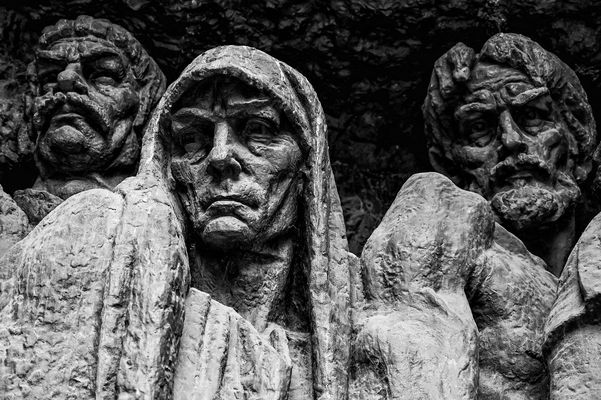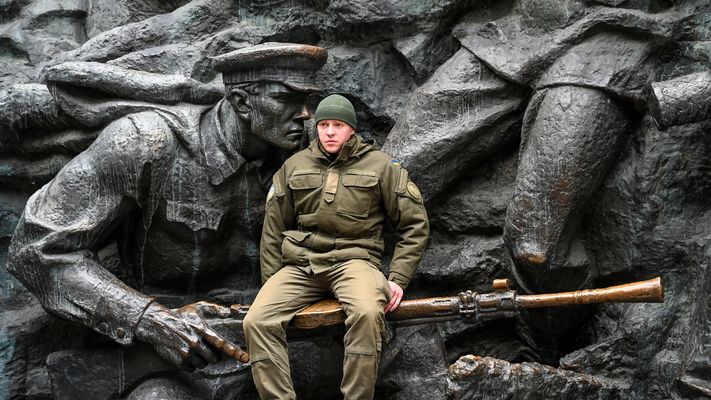Kiew
Kiev or Kyiv (Ukrainian: Київ , Kyiv, IPA: [ˈkɪjiw]; see also Cities' alternative names), is the capital and the largest city of Ukraine, located in the north central part of the country on the Dnieper River. The population as of the 2001 census was 2,611,300. However, higher numbers have been cited in the press.
Kiev is an important industrial, scientific, educational and cultural centre of Eastern Europe. It is home to many high-tech industries, higher education institutions and world-famous historical landmarks. The city has an extensive infrastructure and highly developed system of public transport, including the Kiev Metro.
The name Kiev is said to derive from the name of Kyi, one of four legendary founders of the city (brothers Kyi, Shchek, Khoryv and sister Lybid'). During its history, Kiev, one of the oldest cities in Eastern Europe, passed through several stages of great prominence and relative obscurity. The city may have been founded in the 5th century as a trading post, perhaps part of the land of the early Slavs. It gradually acquired eminence as the centre of the East Slavic civilization, becoming in the tenth to twelfth centuries a political and cultural capital of Rus', a medieval East Slavic state. Completely destroyed during the Mongol invasion in 1240, the city lost most of its influence for the centuries to come. It was a provincial capital of marginal importance in the outskirts of the territories controlled by its powerful neighbors: first the Grand Duchy of Lithuania, followed by Poland and Russia.
Kiew (ukrainisch Київ/Kyiv [ˈkɪjiʊ̯]; russisch Киев/Kiew [ˈkʲijɪf]) ist die Hauptstadt und größte Stadt der Ukraine sowie Verwaltungssitz der Oblast Kiew, dem sie jedoch nicht angehört. Sie liegt am bis hierhin für kleinere Seeschiffe befahrbaren Dnepr (ukrainisch: Дніпро/Dnipro) und hat 2.700.000 Einwohner, als Agglomeration 3.015.108 (Stand 1. Januar 2005). Die Universität wurde 1834 gegründet. Außerdem gibt es 99 Hochschulen, 25 Museen, ein Planetarium, Theater, botanische und zoologische Gärten. Aufgrund seiner vielen Kirchen und Klöster und seiner Bedeutung für die orthodoxe Christenheit wird Kiew seit dem Mittelalter als Jerusalem des Nordens bezeichnet (heute hört man häufiger Jerusalem des Ostens). Ferner wird Kiew aufgrund seiner geschichtlichen Rolle als Mutter aller russischen Städte bezeichnet. Kiew ist Sitz eines ukrainisch-orthodoxen Patriarchen und eines russisch-orthodoxen Metropoliten. Die Kiewer Sophienkathedrale ist die älteste ostslawische Kathedrale. Der Großerzbischof der mit der römisch-katholischen Kirche unierten griechisch-katholischen Kirche ist derzeit dabei, seinen Sitz von Lwiw nach Kiew verlegen. Auf dem Kiewer Stadtwappen ist der Patron von Kiew Erzengel Michael abgebildet.
Kiev is an important industrial, scientific, educational and cultural centre of Eastern Europe. It is home to many high-tech industries, higher education institutions and world-famous historical landmarks. The city has an extensive infrastructure and highly developed system of public transport, including the Kiev Metro.
The name Kiev is said to derive from the name of Kyi, one of four legendary founders of the city (brothers Kyi, Shchek, Khoryv and sister Lybid'). During its history, Kiev, one of the oldest cities in Eastern Europe, passed through several stages of great prominence and relative obscurity. The city may have been founded in the 5th century as a trading post, perhaps part of the land of the early Slavs. It gradually acquired eminence as the centre of the East Slavic civilization, becoming in the tenth to twelfth centuries a political and cultural capital of Rus', a medieval East Slavic state. Completely destroyed during the Mongol invasion in 1240, the city lost most of its influence for the centuries to come. It was a provincial capital of marginal importance in the outskirts of the territories controlled by its powerful neighbors: first the Grand Duchy of Lithuania, followed by Poland and Russia.
Kiew (ukrainisch Київ/Kyiv [ˈkɪjiʊ̯]; russisch Киев/Kiew [ˈkʲijɪf]) ist die Hauptstadt und größte Stadt der Ukraine sowie Verwaltungssitz der Oblast Kiew, dem sie jedoch nicht angehört. Sie liegt am bis hierhin für kleinere Seeschiffe befahrbaren Dnepr (ukrainisch: Дніпро/Dnipro) und hat 2.700.000 Einwohner, als Agglomeration 3.015.108 (Stand 1. Januar 2005). Die Universität wurde 1834 gegründet. Außerdem gibt es 99 Hochschulen, 25 Museen, ein Planetarium, Theater, botanische und zoologische Gärten. Aufgrund seiner vielen Kirchen und Klöster und seiner Bedeutung für die orthodoxe Christenheit wird Kiew seit dem Mittelalter als Jerusalem des Nordens bezeichnet (heute hört man häufiger Jerusalem des Ostens). Ferner wird Kiew aufgrund seiner geschichtlichen Rolle als Mutter aller russischen Städte bezeichnet. Kiew ist Sitz eines ukrainisch-orthodoxen Patriarchen und eines russisch-orthodoxen Metropoliten. Die Kiewer Sophienkathedrale ist die älteste ostslawische Kathedrale. Der Großerzbischof der mit der römisch-katholischen Kirche unierten griechisch-katholischen Kirche ist derzeit dabei, seinen Sitz von Lwiw nach Kiew verlegen. Auf dem Kiewer Stadtwappen ist der Patron von Kiew Erzengel Michael abgebildet.




























































